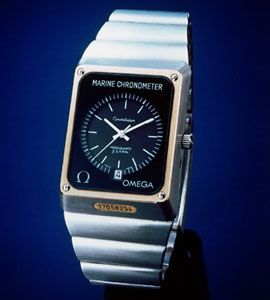|
--
The late Eric Tabarly w/Marine Chronometer
& Sextant determining a ships position
“the old way” OK from the Omega site
.... Developed by OMEGA in
collaboration with the Battele Institute of
Geneva, the first prototypes (cal. 1500) were
presented at the Basel Fair in 1970.
It was first
introduced on the market in 1974 (calibre 1510).
Its unmatched precision of one second a month is
around 10 times superior to that of an ordinary
quartz watch. This precision
results from a specially designed tiny
disc-shaped resonator, sealed in a capsule,
which vibrates at the incredible rate of
2,359,296 times a second ! The high frequency
earned one version, calibre 1511, the title of
Marine Chronometer from the astronomic and
chronometric observatory of Neuchatel - a unique
award. After 63 days of
rigorous testing, the mean variation rate was no
more than 2 thousandths of a second per day ! In
addition, the Megaquartz 2400 was the first
watch equipped with a
time-zone-and-second-adjustment device for
changing the hour without affecting the minutes
or the seconds, for fine second adjustment and
for synchronizing the seconds with an official
time signal. Thus, for the first time in
watchmaking history, the seconds were given
their full importance. Accurate enough... But what
is not stated on the Omega web site is : Only two 151x calibers were
used in the Marine chronometer 2.4
MHz... Caliber 1511 and 1516....
were the "Marine Chronometer" grade versions of the
1510 caliber Megaquartz 2.4 MHz. I have seen it too many
times a seller will post for sale a solid gold
(case ref BA 396.0806 caliber 1510) or a
steel (case ref ST 396.0806 caliber 1510)
only Connie Megaquartz 2.4 MHz with a lapis blue or
blue dial as a "Marine Chronometer" these are not.
The photo attached is one I took at the
Omega Museum in 1999 (shooting thru the glass cases
I lost some detail.) The only (production) model
Omega made as a "Marine Chronometer" 2.4 MHz is a
steel watch with a 14k yellow gold bezel and it
will be signed "MARINE CHRONOMETER" across the top
of the black dial and a 14k gold inset with the
movement serial number is also on the sloping steel
side of the case. In the photo below (also taken at
the Omega Museum) the white dial watch was
one of the prototypes presented at the 1970 Basel
Fair with caliber 1500 also known as the
"Elephant". The Marine Chronometer that
is directly to the left the the sign (w/ ID tag
173) has a case reference (circa 1974)
ST 398.0836 with caliber 1511 movement.
The other Marine chronometer that is directly
to the right of the Prototype has a case ref of
ST398.0832 and uses the later caliber 1516 movement
(circa 1976). From a US catalog and price
list I came across the all steel MegaQuartz (case
ref ST 396.0806 caliber 1510) was priced at 495
USD. The Marine Chronometer 2.4 Mhz ST
398.0836 with caliber 1511 movement or ST398.0832
and uses the later caliber 1516 movement was
price at 1850.00 USD. With over a three times
the cost of the standard steel 2.4 Mhz the people
who muhc have bought these watch knew that they
were special. Just to recap... if
you see either a solid gold or Steel only
with a steel bezel 2.4Mhz wristwatch its not a
Marine Chronometer and it was not certified as one.
It will keep great time and its still a nice watch
but your not buying the "Marine Chronometer".
Then again you might come across one of the
while dial odd case shape prototypes which would be
a great watch to have. I hope in the future that
fewer people are led astray with regards to
put-together Marine Chronometre's. I hope I get
fewer heartbreaking emails saying that they just
bought a gold 2.4 MHz marine
chronometer. "Knowing is half the
battle..." Good Hunting Bill Sohne |
||||||||||||



